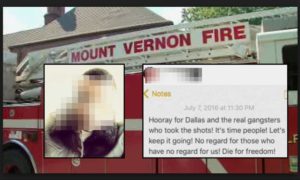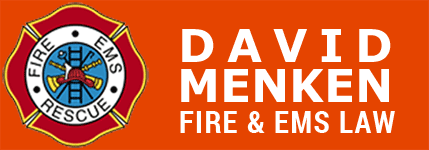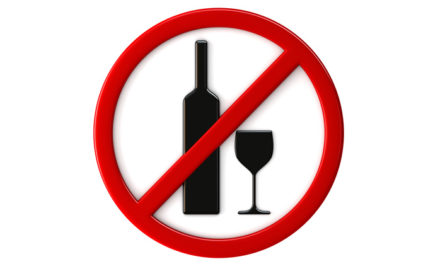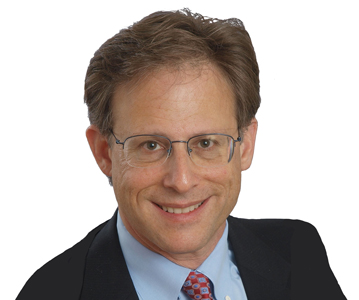
The post that got him suspended
The photo is of the Facebook page of a Mount Vernon NY firefighter, praising the Dallas shooter who killed 5 cops. He was reportedly suspended for his social media post.
It keeps happening. As reported in FireRescue1.com on November 23, 2016, a firefighter from the Sacramento Fire Department has posted comments regarding President-elect Donald Trump and illegal immigrants, stating, “Illegal immigrants welcome … we need the target practice.”
If true, this firefighter will join an august group of firefighters throughout the country who have publicly put their foot in their mouths and been disciplined for doing so. I have presented to fire departments, districts and associates for several years about this problem, and every time I speak I can add new examples to my list.
Like the Mabank Texas volunteer firefighter, who posted on his Facebook page, about the Charleston shooter, “He needs to be praised for the good deed he has done,” and whose Chief had to post on the Department’s Facebook page,
“As of 1123 hrs, after an investigation in the allegations being made of Firefighter K*** [my deletion], the Mabank Fire Department Command Staff has terminated K*** as a volunteer Firefighter permanently and has trespassed him from all Mabank Fire Department property. The Mabank Fire Department does not condone nor promote these type of actions or thoughts. On behalf of all members, the Mabank Fire Department offers our deepest apologies to all that were offended by his actions and comments.”
It is abundantly clear at this point, and has been stressed many times, including on this website, that the comments which firefighters – professional and volunteer – post to their social media accounts (a) can be reasonably regulated by their employer and (b) can get them into serious trouble.
Although the First Amendment protects freedom of speech, providing that “Congress shall make no law … abridging the freedom of speech,” Federal case law nevertheless permits the government to regulate the content of speech by government employees on a limited basis. Firefighters, even volunteer firefighters, are considered government employees for First Amendment issues (if you’re looking for a citation, the case is Reed v. Medford Fire Dept., 806 F.Supp.2d 594, ED NY 2011).
The 1983 Supreme Court case Pickering v. Board of Education (391 US 563) requires government – in this case the fire district or department – to undertake a 2-step analysis: a determination must be made as to whether the speech is a matter of public concern, and if it is, whether the interest of the government employee commenting on a matter of public concern outweighs the State’s interest in effective government.
The Pickering court ruled that when the speech substantially interferes with the legitimate operations of government, it CAN be regulated, but “so long as employees are speaking as citizens about matters of public concern, they must face only those speech restrictions that are necessary for their employers to operate efficiently and effectively.” Prohibiting hate speech would seem to be a reasonable exercise of the right to regulate an employee’s speech.
If the government, in our case the fire department, takes it upon itself to regulate the speech by its employees, paid or volunteer, it needs to make the regulation clear, readable, reasonable and enforceable. It needs a policy regarding the use of social media by its members.
Social media policies abound on the Internet, and may are good, though any policy needs to be tailored specifically to its department. The basic rules:
- Personnel should be free to express themselves as private citizens to the degree that their speech does not impair working relationships of the department.
- Personnel should be prohibited from posting information to which they have access as a result of their position without written permission from the Chief or the President.
- Personnel should be permitted to speak on a matter of public concern as a spokesperson for the department only with written permission from the Chief or President.
- Personnel should be prohibited from publicly discussing fire department matters that are confidential.
- Personnel should be prohibited from engaging in speech that is false, deceptive, libelous, slanderous, misleading or causes harm to others, including speech that constitutes hate speech, or harassment.
I would be happy to send you samples of policies I have prepared if you email me at dmenken@sbjlaw.com.
.





